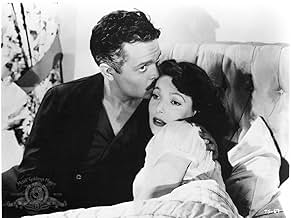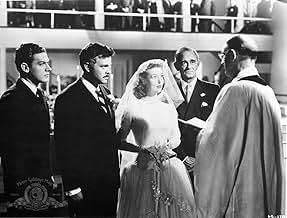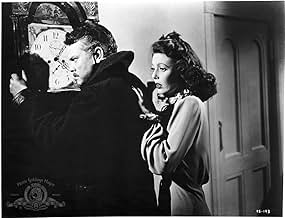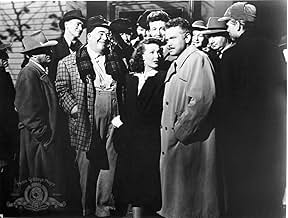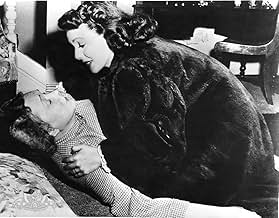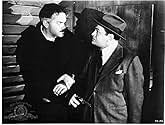IMDb-BEWERTUNG
7,3/10
30.079
IHRE BEWERTUNG
Ein Ermittler der War Crimes Commission reist nach Connecticut, um einen berüchtigten Nazi zu finden.Ein Ermittler der War Crimes Commission reist nach Connecticut, um einen berüchtigten Nazi zu finden.Ein Ermittler der War Crimes Commission reist nach Connecticut, um einen berüchtigten Nazi zu finden.
- Für 1 Oscar nominiert
- 2 Nominierungen insgesamt
David Bond
- Student
- (Nicht genannt)
John Brown
- Passport Photographer
- (Nicht genannt)
Nancy Evans
- Undetermined Role
- (Nicht genannt)
Adolph Faylauer
- War Crimes Commision Member
- (Nicht genannt)
Fred Godoy
- Undetermined Role
- (Nicht genannt)
Theodore Gottlieb
- Fairbright
- (Nicht genannt)
Joseph Granby
- Undetermined Role
- (Nicht genannt)
Ethan Laidlaw
- Todd
- (Nicht genannt)
Empfohlene Bewertungen
A little much in parts, particularly the use of headlight direction that Welles loves to employ, nevertheless, this is a film that rates three stars in the Wellesian collection.
Edward G. Robinson is superb as the laid-back, all-knowing, in-your-face detective and Loretta Young scores as Orson's wife but it's big Billy House who is the real scene-stealer. House plays the man who owns the self-service store in town who likes playing checkers with his customers.
Welles, who looks a little strange--no doubt to match up with the title-provides a commanding performance throughout in a film that reflects the era's revulsion with the Nazi dream.
Edward G. Robinson is superb as the laid-back, all-knowing, in-your-face detective and Loretta Young scores as Orson's wife but it's big Billy House who is the real scene-stealer. House plays the man who owns the self-service store in town who likes playing checkers with his customers.
Welles, who looks a little strange--no doubt to match up with the title-provides a commanding performance throughout in a film that reflects the era's revulsion with the Nazi dream.
Stylish noir trading on public's concern with escaped Nazis following WWII. First part is especially intriguing since we can't be sure what's happening or who Franz Kindler is. The atmosphere is typically Wellesian— shadows galore, imaginative camera set-ups, along with dramatic use of sound. Two features, however, standout for me.
Once the plot comes into focus, we know Kindler (Welles) must do away with Meinicke (Shayne), but how. The forest scene is inspired, more menacing I think than the finale. The two men are on bended knee, in apparent communion with the forces of good, except one of them is not.
Second is Welles' depiction of small town America through druggist Potter (House, in a splendid performance). Grossly over-weight, he sits all day in front of his checkerboard, hoping to entice some sucker into a game, so he can cheat them out of a quarter. Worse, he makes customers serve themselves, apparently so he won't have to move his bulk. Not exactly the neighborly small town of Shadow of a Doubt (1943), for example.
Given the movie's many arresting features, I'm not sure why its profile isn't higher among both noirs and the Welles canon. My best guess concerns a general absence of ambiguity among both characters and situations. Instead, the screenplay is a straight pursuit film of good vs. evil that makes good use of cat and mouse, and of atmosphere, but is unexceptional in storyline. So if you're looking for stylish suspense without tricky moral complications, this is a movie to catch.
Once the plot comes into focus, we know Kindler (Welles) must do away with Meinicke (Shayne), but how. The forest scene is inspired, more menacing I think than the finale. The two men are on bended knee, in apparent communion with the forces of good, except one of them is not.
Second is Welles' depiction of small town America through druggist Potter (House, in a splendid performance). Grossly over-weight, he sits all day in front of his checkerboard, hoping to entice some sucker into a game, so he can cheat them out of a quarter. Worse, he makes customers serve themselves, apparently so he won't have to move his bulk. Not exactly the neighborly small town of Shadow of a Doubt (1943), for example.
Given the movie's many arresting features, I'm not sure why its profile isn't higher among both noirs and the Welles canon. My best guess concerns a general absence of ambiguity among both characters and situations. Instead, the screenplay is a straight pursuit film of good vs. evil that makes good use of cat and mouse, and of atmosphere, but is unexceptional in storyline. So if you're looking for stylish suspense without tricky moral complications, this is a movie to catch.
The IMDb trivia page says this is Orson Welles's least favorite and least personal film. Aside from "Citizen Kane" and "The Magnificent Ambersons," I think this potent film noir is his most enjoyable—certainly more so than the ugly "Lady from Shanghai" or the overbaked and convoluted "Touch of Evil."
Charles Rankin (Orson Welles) is a professor in a respectable Connecticut town about to marry the daughter of a U.S. Supreme Court justice. But his name is fake and his past is filthy. An earnest convert to Christianity (Konstantin Shayne), who once ran a Nazi concentration camp, is capable of exposing him. "Rankin" kills this little old man and buries his body in the forest. But he isn't safe because an investigator (Edward G. Robinson) from the War Crimes Commission is on his tail. Rankin needs his own wife (Loretta Young) to help him elude capture. But his fascination with the local clock tower may prove his undoing.
As a director, Welles strains a bit too hard for effect in this film—and much too hard in everything but "Kane" and "Ambersons." In those two films all of his technical effects, striking as they are, seem effortless and exactly the right choices. Here, he has imperfect moments—such as the scene where his character is frantically, and inexplicably, trying to pick up pieces of paper—but everything else is splendid, especially the climax.
As an actor he's always compelling, but I think he makes one bad choice here. He's too guilty-looking in the early scenes. It makes us wonder why no one suspects him; and it robs us of a dramatic contrast when he begins to realize he's in imminent danger.
Loretta Young is generally a dull actress. She doesn't have enough skill to make an impression in the early scenes; but once the part requires histrionics she performs her duties well enough. Certainly her character is morally dubious and therefore fascinating in itself.
The best performance by far is Edward G. Robinson's. One of the great actors of his time, this ugly man has enough talent and star quality to underplay his role to great effect.
Orson Welles fans might find this exciting, well-plotted thriller too un-Wellesian to suit them. Otherwise, this is highly recommended.
Charles Rankin (Orson Welles) is a professor in a respectable Connecticut town about to marry the daughter of a U.S. Supreme Court justice. But his name is fake and his past is filthy. An earnest convert to Christianity (Konstantin Shayne), who once ran a Nazi concentration camp, is capable of exposing him. "Rankin" kills this little old man and buries his body in the forest. But he isn't safe because an investigator (Edward G. Robinson) from the War Crimes Commission is on his tail. Rankin needs his own wife (Loretta Young) to help him elude capture. But his fascination with the local clock tower may prove his undoing.
As a director, Welles strains a bit too hard for effect in this film—and much too hard in everything but "Kane" and "Ambersons." In those two films all of his technical effects, striking as they are, seem effortless and exactly the right choices. Here, he has imperfect moments—such as the scene where his character is frantically, and inexplicably, trying to pick up pieces of paper—but everything else is splendid, especially the climax.
As an actor he's always compelling, but I think he makes one bad choice here. He's too guilty-looking in the early scenes. It makes us wonder why no one suspects him; and it robs us of a dramatic contrast when he begins to realize he's in imminent danger.
Loretta Young is generally a dull actress. She doesn't have enough skill to make an impression in the early scenes; but once the part requires histrionics she performs her duties well enough. Certainly her character is morally dubious and therefore fascinating in itself.
The best performance by far is Edward G. Robinson's. One of the great actors of his time, this ugly man has enough talent and star quality to underplay his role to great effect.
Orson Welles fans might find this exciting, well-plotted thriller too un-Wellesian to suit them. Otherwise, this is highly recommended.
The Stranger was directed by Orson Welles but he did not adapt it to the screen. Although this is seen as a detraction from the whole by some who have seen it, I believe that Welles' deft directing and penetrating acting is what makes this a Welles film for my taste. He was never a facile actor - but he uses his usual wooden countenance here to the advantage of this role.
Another thing that fascinates me is the underrated status of this engrossing thriller. The action and suspense builds and builds to a peak of excitement that few movies can reach without lots of special effects and Foley work these days. This movie fascinates at every turn without ever seeming as if we are watching art. But art it was in Welles' direction and gentle handling of the unravelling.
Edward G. Robinson is the subtle but welcome prize we receive from this outing. The undercurrents of the horrors that have just come before this movie was made and its actions can be seen seething within his duty to find hidden Nazis. He is methodical and intelligent, it so difficult to see the difference between Robinson the man and Robinson the actor here. He is such a talent that we often mistake his ease for something else but acting -- and of acting he was a master. Plainly seen here as a gift to all of us.
What I like about this and many other good films is how facts are revealed slowly, layer by layer.
Loretta Young was good as the innocent young girl who believes that marriage is a sacred institution, that life has a course to follow which will not be derailed and finds it hard to accept the truth of the horrors behind her marriage.
It was mildly amusing to see a very young Richard Long as the open-minded young man with whom Robinson's character confides certain facts.
I recommend it to fans of psychological thrillers, mysteries and of course, of Mr. Orson Welles. So sad that the studio heads were such disingenuous towards this utter genius of a man who deserved more earnest accolades in his life.
THE STRANGER is not glittering masterpiece but it's a hell of great story that I do not tire of watching...and seeing each piece of the puzzle fall into place.
What MORE could an intelligent person want from a movie?
Another thing that fascinates me is the underrated status of this engrossing thriller. The action and suspense builds and builds to a peak of excitement that few movies can reach without lots of special effects and Foley work these days. This movie fascinates at every turn without ever seeming as if we are watching art. But art it was in Welles' direction and gentle handling of the unravelling.
Edward G. Robinson is the subtle but welcome prize we receive from this outing. The undercurrents of the horrors that have just come before this movie was made and its actions can be seen seething within his duty to find hidden Nazis. He is methodical and intelligent, it so difficult to see the difference between Robinson the man and Robinson the actor here. He is such a talent that we often mistake his ease for something else but acting -- and of acting he was a master. Plainly seen here as a gift to all of us.
What I like about this and many other good films is how facts are revealed slowly, layer by layer.
Loretta Young was good as the innocent young girl who believes that marriage is a sacred institution, that life has a course to follow which will not be derailed and finds it hard to accept the truth of the horrors behind her marriage.
It was mildly amusing to see a very young Richard Long as the open-minded young man with whom Robinson's character confides certain facts.
I recommend it to fans of psychological thrillers, mysteries and of course, of Mr. Orson Welles. So sad that the studio heads were such disingenuous towards this utter genius of a man who deserved more earnest accolades in his life.
THE STRANGER is not glittering masterpiece but it's a hell of great story that I do not tire of watching...and seeing each piece of the puzzle fall into place.
What MORE could an intelligent person want from a movie?
Who says that fear of terrorism is a new development, post 9/11. Imagine the fears and exposed nerve endings of the average towns person living in the shadow of World War II. There was the fear of infiltration by the Nazis with their secret agents, blending in with our everyday citizens. Orson Welles plays just such a guy. He is kind, pleasant, quiet, and very dangerous. He even sets about marrying a woman as part of his secret plot. Edward G. Robinson, who normally would have been the heavy, plays a tired, hard working investigator who is leaving no stone unturned. The plot is intricate, though predictable, and the whole thing is hard to take your eyes off. Welles was a great director, but perhaps an even better actor. He keeps this thing going, raising it above the common fair of the time. The writing keeps the good guys at bay, but the clues continue to sit there, ripe for discovery. The clock tower is a great symbol, continuing to remind us of the urgency of everything. The dramatic irony presented makes us continually uncomfortable. We are treated to the movements and activities of the villain, and being let in, it makes everything more enjoyable. See this if you can.
Wusstest du schon
- WissenswertesThis was the first mainstream American movie to feature footage of Nazi concentration camps following World War II.
- PatzerTwo palm trees are visible in the first scene depicting the fictional Connecticut town.
- Zitate
Mr. Wilson: Well, who but a Nazi would deny that Karl Marx was a German because he was a Jew?
- Alternative VersionenAlso available in a computer-colorized version.
- VerbindungenEdited into Ninja the Mission Force: Citizen Ninja (2012)
Top-Auswahl
Melde dich zum Bewerten an und greife auf die Watchlist für personalisierte Empfehlungen zu.
Details
Box Office
- Budget
- 1.034.000 $ (geschätzt)
- Laufzeit
- 1 Std. 35 Min.(95 min)
- Farbe
- Seitenverhältnis
- 1.37 : 1
Zu dieser Seite beitragen
Bearbeitung vorschlagen oder fehlenden Inhalt hinzufügen



